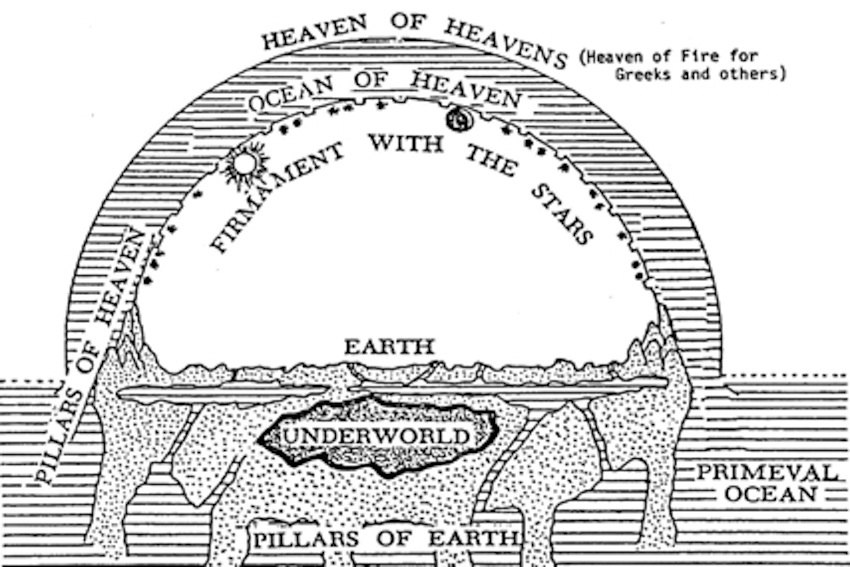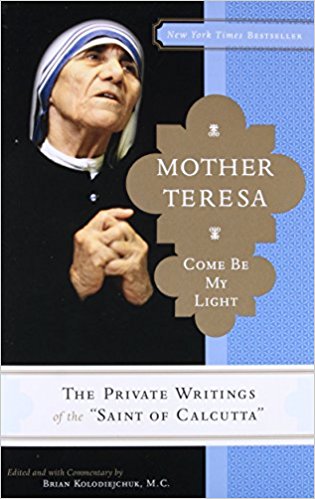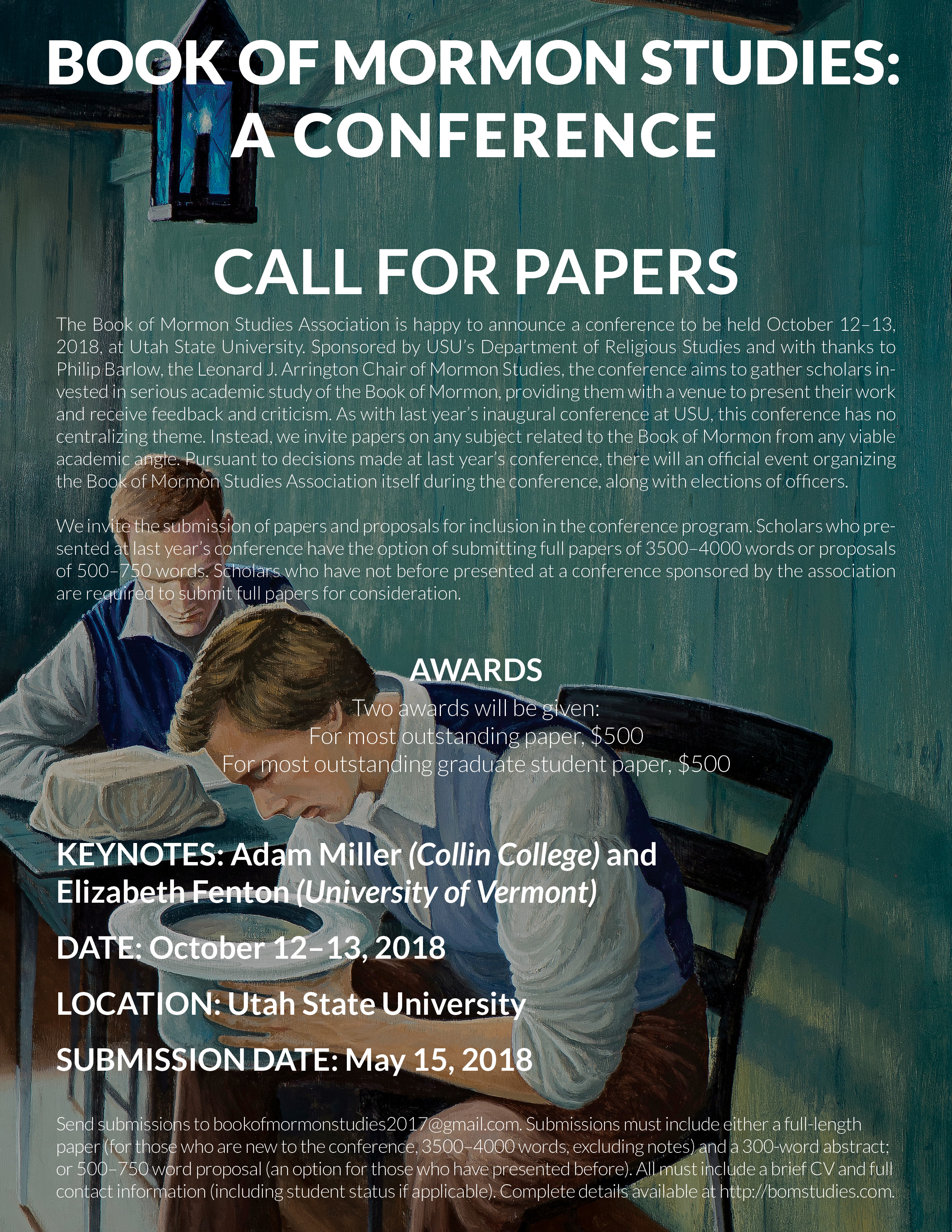-
•
•
27 responses
In the current unhappy state of online Mormon discourse, stating the obvious is sometimes controversial, and for that reason all the more necessary. Read More
-
•
•
The Society for Mormon Philosophy and Theology will be meeting at Utah State on Friday-Saturday, March 16-17, with a focus on “The Exaltation Revelations,” D&C 76, 84, 88, and 93. The program includes talks on divine justice, the potentially universal scope of salvation, the law of the celestial kingdom, the role of the priesthood in salvation, and various perspectives on the eternal nature of humans and our kinship with God. Many of the most distinctive Latter-day Saint teachings appear in a series of revelations received in 1832-33, and recorded in Doctrine and Covenants sections 76, 84, 88, and 93. Richard… Read More
-
•
•
8 responses
In October 2007, I returned home to Texas from my mission in Nevada. In April of the following year, the raid on the YFZ Ranch near Eldorado, TX, occurred. I didn’t think much about it at the time because, you know, they weren’t real Mormons (as many LDS are wont to say). However, a good (non-member) friend called me soon after the raid and posed some questions about these polygamists Mormons, seemingly bothered that one of his best friends was mixed up in an abusive cult. I was likely too dismissive of his concerns, largely due to the mentality above.… Read More
-
•
•
10 responses
“And they did worship the Lord”—that’s the conclusion to the whole row. I wonder at it. What was the change? Read More
-
•
•
-
•
•
2 responses
As part of our work with the 10 Questions team I’m proud to announce their interview with Matthew J. Grow and R. Eric Smith, editors of The Council of Fifty. The council of 50 is one of the more mysterious bodies Joseph Smith organized. Many people didn’t know of this government body in waiting that included non-Mormons. Those that have heard about it often have a lot of erroneous ideas. Check out both the interview and book. Read More
-
•
•
8 responses
Just a quick post on the current kerfuffle over wordprint studies. Wordprint studies are a type of stylometry that look at certain connective words that aren’t main words in a sentence. The claim is that they can determine the authorship of a text. Now I’ve always been skeptical of this, even back in its heyday in the 90’s. The main problem is of course that depending upon how you slice up the text you get very different answers. More significantly with the text from Mosiah through Mormon the author is primarily Mormon. It’s basically impossible to tell, even if a… Read More
-
•
•
19 responses
The eternal cosmological drama in which we’re embedded demands that we work to reflect the divinity of our enemies back to them if we wish them to join with us in our Zionic alliance of apotheosis. And whether we do, that is what we ought to wish. Read More
-
•
•
8 responses

Back when I first was invited to join T&S I started doing a series on Hell in the Book of Mormon. This is the long delayed follow up. Last time I discussed the three broad categories of how hell has been viewed theologically. This time I want to start focusing on the metaphors and typology used to deal with hell in the Book of Mormon with a particular focus on the “lake of fire and brimstone.”[1] Read More
-
•
•
29 responses
What will you do the next time your client drops you into a real-world instance of the prisoner’s dilemma? Read More
-
•
•
34 responses
This is a powerful ethic. I feel its pull deeply. But there is a second half, a dark side Read More
-
•
•
27 responses
On Twitter last week in the aftermath of the whole Porter situation someone mentioned the issue of turning the other cheek. Now first off I don’t think in any legitimate interpretation of turning the cheek it means submitting to abuse particularly spousal abuse. I know there is sadly a strong thread in the Jewish, Christian, & Islamic tradition that doesn’t see this as horrific as it is. That is men who justify running a home like a corrupt totalitarian government on the basis of a few scriptures. However that’s clearly not what Christ taught and certainly isn’t what turning the… Read More
-
•
•
9 responses
First the journalistic malpractice, then BYU-Idaho. Read More
-
•
•
3 responses
In mythically promoting our history we risk undermining it—at least we do so in today’s information age. But this chapter with Laman and Nephi sparring makes me think that perhaps this is always the case. Read More
-
•
•
4 responses
We’re please to be working with Kurt Manwaring over at 10 Questions to bring you some really great interviews. The first one coming up in a little bit will be an April 10 interview with Spencer Fluhman. He’s the executive director of the Maxwell Institute at BYU and is the editor of To Be Learned is Good: Essays on Faith and Scholarship in Honor of Richard Bushman. On April 24th we’ll have an interview with Mark Ashurt-McGee and Sharalyn Howcroft on their new book Foundational Texts of Mormonism. Both these look to be very great books so we’re really excited. Read More
-
•
•
6 responses
The 2018 Church History Symposium will be held on March 1st & 2cd. They’re doing it in two locations. The first day will be at BYU while the second day will be at the Conference Center in Salt Lake City. This is a pretty big conference with the focus on finance. Looking through the presentations there are a ton of fascinating topics. Read More
-
•
•
One response
The Mormon Social Science Association is having a conference at Utah Valley University on February 21st from 1:00 PM – 6:45 PM. This looks to be particularly interesting. The featured speakers are Marie Cornwall and Jana Riess. Marie Cornwall is speaking on “Lessons Learned from a Historical Perspective on Women’s Lives.” There’s been some amazing work on women in Mormon history the past few years. I think we’re getting some important attention on perspectives that have been unduly neglected in how people look at the past of Mormonism. Jana Riess is speaking on Mormon Millennials and generational change. I suspect… Read More
-
•
•
15 responses
I don’t care what kind of faith you have, Nephi’s idea on the face of it is loony. Read More
-
•
•
8 responses
Two remarkable items: the repetition of Nephi’s mantra concerning the need to keep the commandments of God in order to prosper and to see the hand of the Lord; the placement of this mantra immediately preceding Laman’s criticism. Read More
-
•
•
28 responses

Helaman 12:15 reads, “according to his word the earth goeth back, and it appeareth unto man that the sun standeth still; yea, and behold, this is so; for surely it is the earth that moveth and not the sun.” If you’re like me you’ve always just read that as Mormon (or possibly Nephi) just having a knowledge of heliocentric astronomy (everything orbits the sun rather than the earth). The author appears to be alluding to Joshua 10:12-13 where the moon and the sun stand still.[1] The last week I’ve been discussing the verse with some other people which have made me… Read More
-
•
•
13 responses
There are, I think, only two fundamental requirements that a Mormon reading of scripture must fulfill. Read More
-
•
•
42 responses
I did not have a positive reaction to Elder Rasband’s talk in the most recent General Conference, and I wasn’t happy when our Elder’s Quorum teacher announced we would be basing our lesson on it last week, either. But I decided to try re-reading the talk with an open mind, and I’m glad I did. The main reason the talk, By Divine Design, rubbed me the wrong way when I first heard it, is that I associate people who see God’s hand in numerous, small, every-day coincidences with the same class of superstitious belief that finds meaning horoscopes. This is,… Read More
-
•
•
Heaven & Earth Mormonism and the Challenges of Science, Revelation and Faith February 22nd – 23rd, 2018 Classroom Building, Room 511 Utah Valley University Program PDF here; conference website here. The relationship between science and religion has been among the most fiercely debated issues since the Copernican revolution displaced traditional wisdom regarding the nature of the cosmos. Some have argued for a sharp division of labor while others have sought to harmonize spiritual and empirical truths. From its beginnings, Mormonism has wrestled with the implications of modern science and has produced a variety of theological responses. This conference will explore… Read More
-
•
•
12 responses
In passages like this one, Nephi strikes me as incredibly concrete and practical in nature—much more a Brigham Young than a Joseph Smith. Read More
-
•
•
9 responses
Like the story of Moses (to which Nephi often refers) the story of Lehi’s & Saraiah’s exodus is epic and foundational, as well as typological. Read More
-
•
•
16 responses

A few years ago, President Rosemary Wixom of the Primary shared a story from the life of Mother Teresa in General Conference: In a 1953 letter, Mother Teresa wrote: “Please pray specially for me that I may not spoil His work and that Our Lord may show Himself—for there is such terrible darkness within me, as if everything was dead. It has been like this more or less from the time I started ‘the work.’ Ask Our Lord to give me courage.” Archbishop Périer responded: “God guides you, dear Mother; you are not so much in the dark as you… Read More
-
•
•
82 responses
So many were shocked by today’s Gallup poll breaking down Trump’s job approval rating by religion. More Mormons approved of Trump’s Job performance than any of the other religious groups. A staggering 61% of Mormons approved of his performance. Like many people I was shocked it was that high. I suspect the poll seemed worse given it came out on a day when Trump was once again enmeshed in controversy over racist comments. Read More
-
•
•
34 responses
This week in Sunday School and Primary the lesson is on Abr 3 and Moses 4 with a focus on the plan of salvation. I wanted to go in a somewhat different direction than the lesson would go. You might call this my scribbling on the margins of the lesson. Read More
-
•
•
Submissions are due this coming Monday for the Society for Mormon Philosophy and Theology’s upcoming conference at Utah State University, March 15-17. The conference theme is “The Exaltation Revelations,” D&C sections 76, 84, 88, and 93. For full details see the Call for Papers (PDF). Read More
-
•
•
48 responses
The NYT’s framing of the life of President Monson was, to say the least, interesting. The obituary begins: Thomas S. Monson, who as president of the Church of Jesus Christ of Latter-day Saints since 2008 enlarged the ranks of female missionaries, but rebuffed demands to ordain women as priests and refused to alter church opposition to same-sex marriage, died on Tuesday at his home in Salt Lake City. He was 90. It’s just as illuminating to contrast the way the NYT approached President Monson’s death with that of other leaders. Here’s their tweet for President Monson. Thomas Monson, the president… Read More

